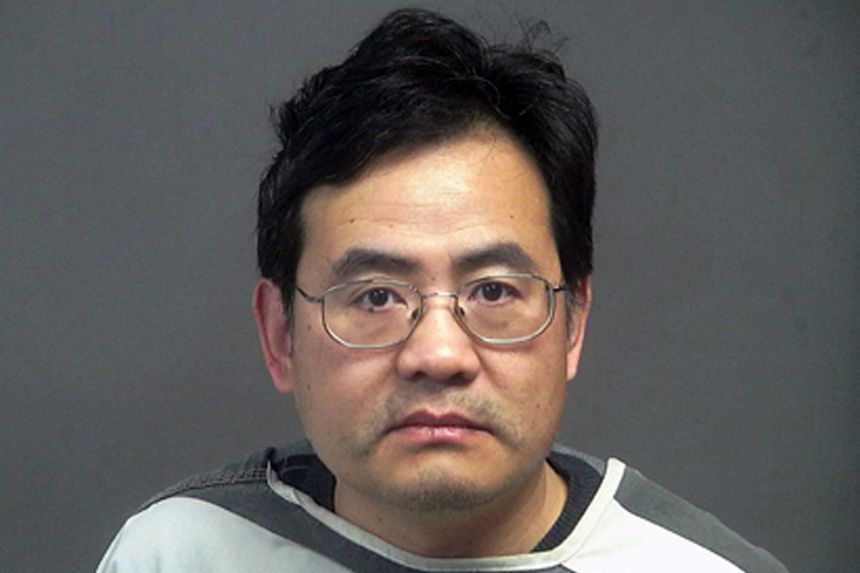Mistrial declared in US case of Tennessee scientist accused of hiding China work
Sign up now: Get ST's newsletters delivered to your inbox

Dr Hu Anming is one of several researchers arrested and accused of failing to disclose ties with China.
PHOTO: BLOUNT COUNTY SHERIFF'S OFFICE
Follow topic:
WASHINGTON - A US judge on Wednesday (June 16) declared a mistrial in the case of a Chinese scientist in America accused of hiding his ties with a Beijing university to receive federal research grants.
The case raised concerns over whether the US Justice Department is over-reaching in its broader drive to ferret out China spies.
Former University of Tennessee associate professor Hu Anming, 52, is one of several researchers who have been arrested and accused of failing to disclose their ties with China over the past two years.
He was first indicted in February 2020 under the Justice Department's China Initiative, an effort started under the Trump administration to root out and prosecute individuals stealing American trade secrets to benefit China.
Dr Hu, a naturalised Canadian citizen who left China more than a decade ago to pursue a second doctorate in Canada, was not charged with spying for China.
Over the course of the six-day trial, his defence lawyer argued that he was being targeted by federal agents who were determined to find Chinese spies where there were none, the Knoxville News Sentinel reported.
When agents failed to secure an espionage charge, they turned instead to a charge of fraud, he said.
Dr Hu was prosecuted under a 2011 law that bans agencies like the National Aeronautics and Space Administration (Nasa) from funding projects involving collaboration with Chinese-owned companies and Chinese universities.
Federal prosecutors zeroed in on how Dr Hu had not mentioned a post he had with the Beijing University of Technology in conflict-of-interest forms for the University of Tennessee and in Nasa applications. Dr Hu, a nanotechnology specialist, ended up receiving two Nasa grants in 2016 and 2018.
University officials testified that the form had asked Dr Hu to list any outside work that earns him more than US$10,000 (S$13,400), said the Knoxville News Sentinel.
As Dr Hu earned less than US$2,000 annually from his work with Beijing University, he did not think this met the threshold for disclosure, his lawyer said. Dr Hu also disclosed his ties with the Beijing university in two other forms.
The jury said on Wednesday that it could not reach a verdict, leading to the judge declaring a mistrial - that is, halting the trial and deeming it invalid due to the deadlocked jury.
Federal prosecutors can choose to charge Dr Hu, who lost his tenured post as a result of the indictment, again. His wife had raised funds for his legal defence on the GoFundMe platform.
During cross-examination, details emerged of how federal agents had made unsubstantiated claims that Dr Hu was a spy, even using false information to place him on the federal no-fly list and spy on him and his son for two years, the Knoxville News Sentinel reported.
FBI agent Kujtim Sadiku testified that he had been tipped off that Dr Hu might be a spy in China's Thousand Talents Programme, an academic talent recruitment drive that the US says encourages researchers to illegally transfer cutting-edge tech to China.
Mr Sadiku told jurors that he had searched on Google and found a Chinese news release and flier with Dr Hu's photograph, and that he had used Google Translate for a "rough translation" of the document.
Through this, he found out that Dr Hu had been awarded a short-term contract in 2012 to teach students at the Beijing University of Technology, and formally launched an economic espionage probe in response.
Defence attorney Phil Lomonaco said that Mr Sadiku had sought to secure a fraud indictment after the economic espionage probe fell apart.
"You wanted to find a Chinese spy in Knoxville," he said, according to the Knoxville News Sentinel.
Mr Sadiku replied: "My job is to find spies, yes."
The agent also admitted to using false information to pressure Dr Hu to spy for the US government.
While several researchers have pleaded guilty or been successfully convicted under the China Initiative, Asian American groups say that the hunt for spies in academia is leading to the racial profiling of ethnic Chinese researchers and students.
Scientists are also warning that the government, in its zeal to stop the flow of technology and trade secrets to China, is placing such strict requirements on researchers that they are getting in the way of international scientific collaboration.
"The rules are so far-reaching that scientific collaborations with literally every nation... are being tracked and recorded. US scientists are just now realising they may be in legal jeopardy if strict rules are not followed," Cornell University virologist John P. Moore wrote in a Washington Post commentary on Tuesday.
Mr Alex Nowrasteh, the director of immigration studies at the Washington-based Cato Institute think-tank, warned in a post that the China Initiative had given officials a political mandate and incentive to find Chinese spies, even when they did not exist.
"The government admits that Hu wasn't a spy and that it was trying to make him become one by relying on some weak evidence and paperwork errors," wrote Mr Nowrasteh.
"This is neither the last nor the first time that bad political incentives lead to shambolic prosecutions of non-spies for espionage-related offences."

